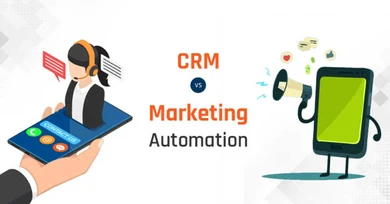Marketing is one of the focus areas for most businesses looking to scale. Most business owners want to make marketing seamless. There are countless tools and software made for that purpose.
Many people need help distinguishing between CRM and marketing automation. In this article, we answer your question about the difference between CRM and marketing automation.
What is a CRM?

A CRM is a customer relationship management software. A CRM is a sales software that assists sales reps in managing the sales process. The work of a CRM is to collect and analyze data about a customer’s past interactions with the company and use it to create better relations in the present.
CRMs help enhance the sales process and increase sales.
The core purposes of a CRM include:
- Store customer contact data
- Streamline sales processes
- Manage communication
- Build rapport with customers
A CRM supports the customer acquisition process even the after-sales processes. It helps streamline the sales pipeline by supporting each part of the sale from the point a customer expresses interest to the time they make a sale.
What Are the Benefits of a CRM?
Customer Relationship Management software is beneficial to the business.
Here are the top benefits of a CRM:
- Assists in managing customers. Large businesses have a long list of customers. Managing them also includes handling tons of customer contact information. With a CRM, businesses can easily manage their customers.
- Builds better customer relationships. A CRM helps strengthen customer service. The open lines of communication with customers help foster lasting relationships with your brand. Personalized messaging keeps customers interested in your brand and makes them feel heard.
- Increases profits. Improving and perfecting sales services leads to an increase in ROIs. Better customer service and streamlined sales services keep your customers happy increasing the turnover. The average ROI value per dollar spent on CRM software is $8.71/ dollar spent.
Using CRM helps you understand the sales processes and keep your team up to task. Without CRM, you would struggle to understand what your sales team is doing. Most salespeople have an easy time meeting and surpassing their work goals thus increasing their sales revenue.
Sales reporting is often a grueling task that can interrupt daily activities for a sales team. A CRM generates reports as needed making it a minor task. Integrating the system with other software can make data analysis easier for teams.
What Is Marketing Automation?
Marketing automation cuts the time marketers spend on mundane tasks and helps them focus on important tasks in marketing. Manual inbound marketing can be time-consuming. While the tasks are necessary, using that effort on other things can have the desired outcomes.
You can get help with tasks like social media posting, email marketing, and running ad campaigns through an automation tool. The tools improve efficiency and ensure a personalized experience for your customers.
Marketing automation tools create smooth workflows for marketers. When a customer expresses interest in a product, they can send links to blog posts and other materials that offer information about their interest.
Marketing software helps your marketing team not dwell on monotonous and redundant tasks. It has an in-built analytics that provides insights on how to refine marketing processes for maximum gains.
With marketing software, every lead gets maximum specialized attention. It also helps create great marketing campaigns.
What Are the Benefits of Marketing Automation?

Here are the key benefits of marketing automation:
- Increases productivity. Marketing teams can get more done within a shorter amount of time.
- Leads to customer satisfaction. Customers feel connected to brands through personalized messaging and a quick response rate.
- Increases profitability. Productivity means increasing leads and outreach which translates to more sales and profits.
What Is the Difference Between CRM and Marketing Automation?
Marketing automation is marketing-centric while CRM is sales-centric. While they seem similar, they work for a lead at different stages of the buyer journey. Marketing turns prospects into leads.
The marketing automation tool is where a brand connects with an audience building curiosity. Once someone turns into a lead, CRM takes over and helps move the customer through the sales pipeline.
Marketing software is of no use when someone turns into a buyer. The only thing marketing automation may do is re-targeting and upselling to the buyer.
How Do CRMs and Marketing Automation Work Together?
Sales and marketing go hand in hand. Marketing automation and CRM can work together to create a robust buyer ecosystem. Marketing automation is where it all begins. Marketers build interest with an audience and collect valuable data for prospective buyers.
They hand the information to the sales team that goes into the CRM. Sales reps nurture leads and move them along the sales pipeline. Once they turn into buyers. Sales and marketing teams working together streamline the buyer process. It leads to a better customer experience and enhances the outcomes.
Final Words
No doubt, Marketing automation, and CRM seem alike. Yet, they play different roles. CRMs are for sales teams while marketing automation helps marketers do their work. Using the two together enhances the customer experience and improves the sales outcomes.
